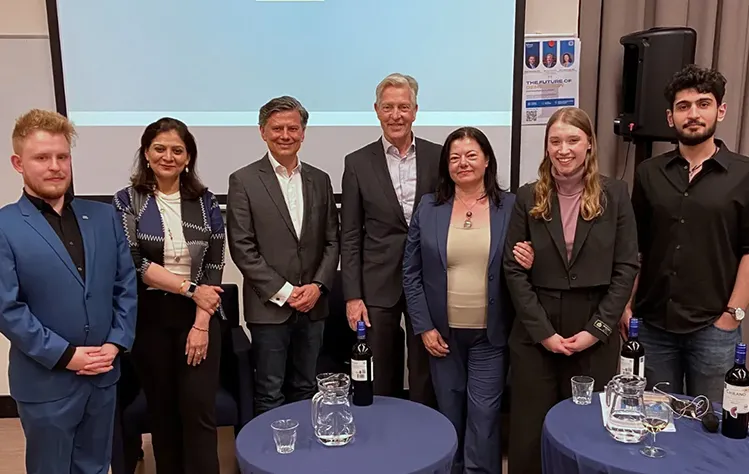Political Discussion: Webster Leiden IR Club; Future of Democracy and Engagement
May 28, 2025

Webster Leiden’s International Relations (IR) Club hosted a compelling political discussion event titled “The Future of Democracy: Citizen Engagement in the 21st Century.”
Designed to encourage critical thinking and foster active dialogue, the event drew a dynamic mix of students, faculty, staff and public attendees, both in person and online.
The evening featured an esteemed panel of experts from Webster University’s International Relations department, including Dr. Piotr Perczynski, Dr. Nives Rumenjak and a special guest speaker, Mr. Eric Stokkink, Director of ProDemos. Together, they examined the evolving role of civic participation in shaping democratic societies, with a focus on the growing influence on youth engagement.
The event commenced with a warm welcome from Leiden Campus Director Professor Jean-Paul Van Marissing, who joined virtually from Tbilisi, Georgia. He expressed gratitude for the impressive turnout and emphasized the significance of examining democracy from both historical and contemporary perspectives. Professor Van Marissing also noted a recurring pattern in history, where those entrusted with upholding democracy often rely on a "hope for the best" strategy rather than fully utilizing their authority to safeguard democracy and maintain peace.
Event Highlights and Reflections from Attendees
The event sparked vibrant dialogue among panelists, and led to meaningful reflection among participants. Key highlights of the event underscored the focus on democratic education while emphasizing the importance of fostering democratic values and understanding among both youth and adults. Furthermore, the event addressed the contemporary challenges of polarization and urged the audience to engage with organizations and firms that promote democracy and to actively participate in inclusive change initiatives.
At the end of the event, the audience seemed to appreciate the dialogue's open and inclusive nature, which was meant to encourage them to rethink their role in democratic processes.
“It was eye-opening to realize how much influence young citizens can have when they engage thoughtfully in political life,” said a graduate International Relations student.
Other participants noted the importance of hearing from both academics and other experts. Stokkink’s insights on civic education, political awareness and democracy in the Netherlands and globally provided a practical perspective that complemented the academic foundation established by Perczynski and Rumenjak.
Some attendees remarked on the global relevance of the discussion, acknowledging that the challenges and opportunities facing democracy today are shared across borders and cultures. As democratic institutions worldwide face new pressures and transformations, conversations like these serve as crucial reminders of the power of informed and engaged citizens. The success of the International Relations Club’s event highlights a growing appetite among students to actively shape the future of democracy, not just as observers, but also as participants.
Webster Leiden remains committed to fostering dialogue through academic events, public engagement and student-led initiatives.
As one attendee said, “Democracy doesn’t end at the ballot box; it lives in our daily conversations, actions and commitments.”
The event concluded with closing remarks from Academic Director Dr. Sheetal Shah, who expressed her heartfelt appreciation for the success of the student-led IR club initiative. She conveyed her gratitude to the audience for their engaging participation during the Q&A and commended the panelists for their thorough contributions. Emphasizing the power of education, Dr. Shah noted that students’ thoughtful involvement in complex discussions exemplified how respectful dialogue can drive meaningful progress. She concluded by highlighting three essential pillars: knowledge, attitude and skills, as key takeaways, urging the audience to carry them forward in both personal and professional life.
With this spirit in mind, Webster Leiden continues to offer platforms where the next generation of global citizens can question, challenge and contribute to democratic life, both locally and internationally.
